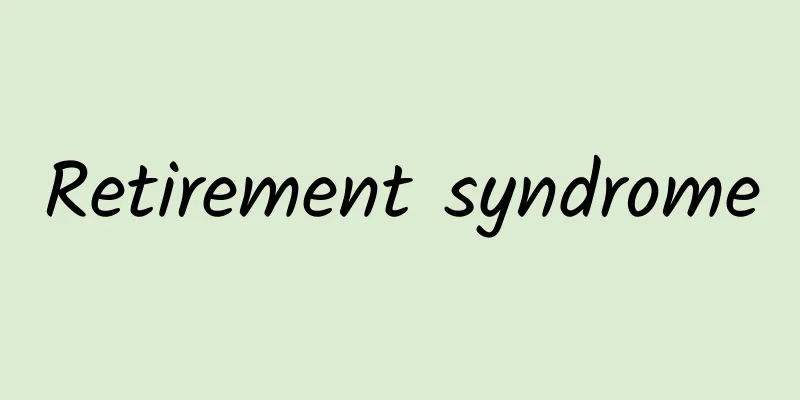Retirement syndrome

|
Retirement syndrome refers to the negative emotions such as anxiety, depression, sadness, fear, etc. that occur when the elderly cannot adapt to the new social role, living environment and lifestyle after retirement, or behave in a manner that deviates from the norm. This is an adaptive psychological disorder. This disorder can also cause other physiological diseases, directly harm the physical and mental health of retired elderly people, and accelerate the aging process. Therefore, it must be controlled and eliminated in a timely and effective manner. 1. What are the main manifestations of retirement syndrome? (1) Anxiety symptoms: prominent feelings of loneliness and emptiness, severe feelings of loss and worthlessness, restlessness, anxiety, tension, irritability, inability to concentrate, lack of patience in doing things, and easy to be irritated and angry. (2) Depressive symptoms: sadness, melancholy, frustration, low spirits, listlessness, a strong sense of loss, loneliness, and old age and uselessness, decreased self-confidence, loss of interest, withdrawal, and laziness to do things. (3) Physical discomfort symptoms: Unhealthy psychology and negative emotions will seriously interfere with and damage the physiological functions of the elderly, causing or aggravating various psychosomatic diseases. Symptoms such as headache, dizziness, general fatigue, limb weakness, insomnia, chest tightness and palpitations often occur. 2. Who is prone to retirement syndrome? (1) Personality characteristics: Usually stubborn and conservative, self-centered, insisting on his own views, not accepting new things in society, prone to getting stuck in a rut, sensitive and suspicious. (2) Interpersonal relationships: Some people have poor interpersonal relationships, have few or no friends, rarely engage in social activities, lead a monotonous life, have no interest in the things around them, and often feel lonely, depressed, and worried. (3) Personal hobbies: People who have no special hobbies other than work before retirement will lose their spiritual sustenance after retirement, lack the ability to handle family and personal life, and do not know how to arrange their free time. Their lives become boring and lack interest, and they are prone to psychological disorders. (4) Nature of occupation: Before retirement, the job position is relatively important, especially for people who hold leadership positions. When they suddenly retire from their original jobs, their lifestyle undergoes a major change and they suffer a huge psychological gap, which can easily lead to psychological changes such as loss, loneliness, emptiness, and inferiority. 3. Does retirement syndrome require treatment? Generally speaking, retired elderly people can accept new living habits and interpersonal relationships after retirement through their own active adjustment or with the help of their families, and gradually adapt to their new old age. Elderly people who cannot adapt, if they are depressed, unwell, or even have their normal life and social functions affected, need to go to a psychiatric hospital as soon as possible to consult and receive treatment from experts in mental health and psychology, and never be afraid to seek medical treatment. 4. How do the elderly get through the adjustment period after retirement? (1) Adjust your mentality and follow the rules. Aging is an objective law that cannot be changed by human will, and retirement is inevitable. Before retiring, the elderly should accept this fact psychologically and plan a retirement life model that suits them based on their life experience, living habits and personality characteristics. (2) Make use of the remaining energy and return to society. If retired personnel are energetic and have a skill, they can continue to do some work within their capacity, which can not only make use of their remaining energy and contribute to society, but also provide spiritual comfort and enrich their lives. (3) Cultivate hobbies and find spiritual comfort. You can use your free time after retirement to cultivate some hobbies and interests to enrich and enrich your life, which can not only cultivate your sentiments, but also exercise your body and improve your physical and mental health. (4) Expand social life and enrich life. Create a harmonious family atmosphere, establish harmonious interpersonal relationships, and interact more with relatives and friends. Good interpersonal relationships can expand the scope of life, relieve loneliness, and add interest to life. (5) Live a self-disciplined life and take good care of your body. Live a regular life, develop a practical schedule, take a form of rest, exercise and entertainment that suits you, learn to release psychological pressure, relieve tension, and establish a lifestyle with health care as the purpose. |
<<: "Empty-Nest" Elderly People Beware of "Empty-Nest Syndrome"
>>: Chronic obstructive pulmonary disease
Recommend
What are the causes of bleeding during pregnancy?
Pregnancy is a big deal. For a woman, it will bri...
What is menstrual blood composed of?
Every woman will have menstruation, but most wome...
The woman is always bleeding
Except for special circumstances such as menstrua...
What are the factors that cause myocarditis and how to provide daily care?
Myocarditis refers to localized or diffuse inflam...
Confirmed! The human immune system can "remember" the new coronavirus for more than a year
After fighting off the attack of the new coronavi...
What is the cause of light yellow watery leucorrhea
Leucorrhea is the product of a woman's normal...
Can mild female ankylosing spondylosis be cured?
If female friends are found to have some mild sti...
Fetal genital development process_child development process in the uterus
Friends who understand biology know that the gend...
How many days does the menstrual period last?
Many women feel scared and excited when they get ...
How to maintain the endometrium
Women have a menstrual cycle every month. The thi...
Does eating black fungus during pregnancy affect the fetus?
Fungus is very rich in nutrients, so it is loved ...
Can I get pregnant with an ovarian cyst?
Ovarian cysts affect the reproductive health of m...
Where is the best barbecue in Changsha? What is the recipe for barbecue tin foil sauce?
Barbecue can be divided into direct and indirect ...
Pregnant woman afraid of heat is it a boy or a girl
Does a pregnant woman who is afraid of high tempe...
How long after myomectomy can I have sex?
Although uterine fibroid surgery does not affect ...









